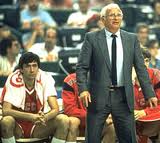After the Second World War basketball became one of the most important sports in the former Soviet Union . The National Team was worlwide known as the strong former club "Red Army" and it was totally dominant till the '80's at Euro level, winning 14 European Championships, but also 2 World Championships (1967 and 1982) and 2 Olympics (1972 and 1988).
After the dissolution of the Soviet Empire in 1991, the successor indipendent countries all set up their own national teams. Based on the number of titles, the basketball program of the former Soviet Union remains one of the most successful in the history of international basketball competitions. The Russian National Team was back at high level winning two Silver medals at the FIBA World Championships 1994 and 1998 while the most recent success was winning Gold at Eurobasket 2007 in Spain.
The games between the Russians and Americans during the "Cold War" were memorable and the unforgettable and controversial finals at the Olympics in Munich, Germany in 1972 has become a piece of modern history about the difficult relationship between the two power nations.
Among the most influent characters that built basketball successes in the Soviet Union first and then Russia Warsaw and a few days later liberated Auschwitz: Gomelsky was Jewish, only 17 years old, and a huge love for basketball. He attended the high school in Leningrad (now St Petersburgh) where he started his career as a coach. In 1966 he took the helm at CSKA. Gomelsky - he was nicknamed Silver Fox - coached the Soviet Union National team for almost 30 years, leading them to 6 European Championships titles, 2 World Championships titles, and the Olympics Gold medal in 1988 in South Korea.
He was the Soviet National team coach in 1972 too, and was expected to coach the team at 1972 Summer Olympics but the KGB (soviet intelligence) confiscated his passport fearing that, since Gomelsky was Jewish, that he would defect to Israel. The Soviets won the Gold with his assistant Vladimir Kondrashin as head coach, thank to a controversial call of a buzzer-beater basket over the USA in the finals.
"At that time there were no clinics, the TV was just born, there were only very few books to study, we were all self-taught - Gomelsky said when he was asked about his incredible career - but we had so much passion and desire to learn". The birth of the European Competitions was a crucial step because it allowed him to travel to foreign countries and experience new styles of basketball. Once retired from coaching, Gomelsky stayed always close enough to basketball, publishing 10 books and becoming a commentator for the Russian television. He was named the president of the Russian Basketball Federation
Coach Alexander Gomelsky passed way in 2005.




No comments:
Post a Comment